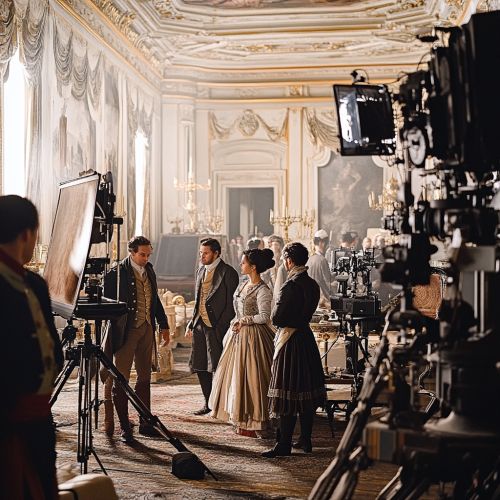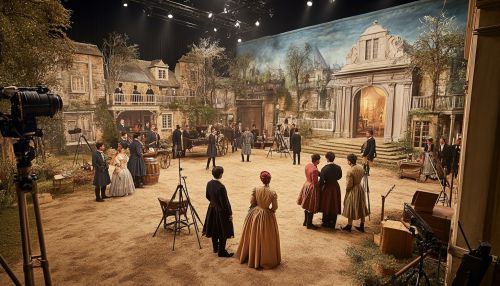Historical drama films
Overview
Historical drama films are a genre of cinema that combines the dramatic storytelling techniques of traditional drama with historical settings and characters. These films often aim to provide a realistic portrayal of historical events, figures, and periods, while also engaging the audience with compelling narratives and emotional depth. The genre is known for its meticulous attention to detail in terms of costumes, settings, and historical accuracy, although artistic license is often taken to enhance the story.
Characteristics
Historical drama films are characterized by their focus on historical accuracy, detailed period settings, and complex character development. They often explore significant historical events, social and political issues, and the lives of notable historical figures. The genre can be divided into several sub-genres, including biographical films, war dramas, and period pieces.
Historical Accuracy
One of the defining features of historical drama films is their commitment to historical accuracy. Filmmakers often conduct extensive research to ensure that the settings, costumes, and events depicted in the film are as accurate as possible. However, it is not uncommon for directors to take creative liberties to enhance the narrative or to make the story more accessible to contemporary audiences.
Period Settings
The settings of historical drama films are meticulously crafted to reflect the time period in which the story takes place. This includes the use of authentic locations, period-appropriate architecture, and historically accurate props and costumes. The goal is to immerse the audience in the historical context and to create a believable and engaging world.
Character Development
Historical drama films often feature complex and well-developed characters, many of whom are based on real historical figures. These characters are typically portrayed with a high degree of psychological depth, and their personal struggles and triumphs are central to the narrative. The genre often explores themes of power, ambition, love, and betrayal, and the characters' actions are frequently influenced by the historical context in which they live.
Sub-genres
Historical drama films can be categorized into several sub-genres, each with its own unique characteristics and focus.
Biographical Films
Biographical films, or biopics, are a sub-genre of historical drama that focuses on the life of a specific historical figure. These films aim to provide an in-depth portrayal of the individual's life, achievements, and struggles. Examples of notable biographical films include "Gandhi," "Schindler's List," and "The King's Speech."
War Dramas
War dramas are a sub-genre of historical drama that focuses on the experiences of individuals during times of war. These films often depict the horrors of war, the impact on soldiers and civilians, and the broader social and political implications. Examples of notable war dramas include "Saving Private Ryan," "Dunkirk," and "The Thin Red Line."
Period Pieces
Period pieces are a sub-genre of historical drama that focuses on a specific historical period, often exploring the social, cultural, and political issues of the time. These films may not focus on a specific historical event or figure but instead aim to provide a broader portrayal of the era. Examples of notable period pieces include "Pride and Prejudice," "The Age of Innocence," and "A Room with a View."
Notable Directors and Films
Several directors have made significant contributions to the historical drama genre, creating films that are both critically acclaimed and commercially successful.
Steven Spielberg
Steven Spielberg is one of the most renowned directors in the historical drama genre. His films often combine meticulous historical research with compelling storytelling. Notable historical dramas directed by Spielberg include "Schindler's List," "Saving Private Ryan," and "Lincoln."
Ridley Scott
Ridley Scott is another prominent director known for his work in the historical drama genre. His films are characterized by their epic scale, stunning visuals, and attention to historical detail. Notable historical dramas directed by Scott include "Gladiator," "Kingdom of Heaven," and "The Last Duel."
David Lean
David Lean is a legendary director known for his sweeping historical epics. His films are celebrated for their grand scale, intricate storytelling, and breathtaking cinematography. Notable historical dramas directed by Lean include "Lawrence of Arabia," "Doctor Zhivago," and "A Passage to India."
Production Techniques
The production of historical drama films involves several specialized techniques to ensure historical accuracy and to create an immersive experience for the audience.
Research
Extensive research is a crucial aspect of producing historical drama films. Filmmakers often consult historical texts, archival materials, and experts in the field to ensure that the film accurately represents the time period. This research informs everything from the script and dialogue to the costumes and set design.
Set Design
The set design for historical drama films is meticulously crafted to reflect the historical period. This includes the use of authentic locations, period-appropriate architecture, and historically accurate props. Set designers often work closely with historians and researchers to ensure that every detail is accurate.
Costume Design
Costume design is another critical aspect of historical drama films. Costume designers conduct extensive research to create clothing that accurately reflects the fashion of the time period. This includes the use of authentic fabrics, patterns, and construction techniques. The costumes play a significant role in immersing the audience in the historical context and in defining the characters.
Cinematography
Cinematography in historical drama films often aims to capture the grandeur and authenticity of the historical setting. This includes the use of natural lighting, period-appropriate color palettes, and traditional camera techniques. Cinematographers often work closely with the director and production designer to create a visually cohesive and historically accurate film.
Impact and Reception
Historical drama films have had a significant impact on both the film industry and popular culture. They often receive critical acclaim for their storytelling, performances, and production values, and many have achieved commercial success.
Critical Acclaim
Many historical drama films have been critically acclaimed for their storytelling, performances, and historical accuracy. Films such as "Schindler's List," "Lawrence of Arabia," and "The King's Speech" have received numerous awards and accolades, including Academy Awards for Best Picture, Best Director, and Best Actor.
Commercial Success
Historical drama films have also achieved significant commercial success. Films such as "Gladiator," "Braveheart," and "Titanic" have been box office hits, grossing hundreds of millions of dollars worldwide. The commercial success of these films demonstrates the broad appeal of the genre and its ability to attract large audiences.
Cultural Impact
Historical drama films have had a lasting impact on popular culture, shaping public perceptions of historical events and figures. They often spark interest in history and inspire audiences to learn more about the time periods and individuals depicted in the films. Additionally, historical drama films have influenced other media, including literature, television, and theater.
Challenges and Controversies
The production of historical drama films is not without its challenges and controversies. Filmmakers often face criticism for historical inaccuracies, cultural insensitivity, and the portrayal of historical figures and events.
Historical Inaccuracies
One of the most common criticisms of historical drama films is the presence of historical inaccuracies. Filmmakers may take creative liberties with the facts to enhance the narrative or to make the story more accessible to contemporary audiences. While some inaccuracies are minor, others can significantly distort the historical record and mislead audiences.
Cultural Insensitivity
Historical drama films can also face criticism for cultural insensitivity. This includes the portrayal of historical events and figures in a way that is biased or offensive to certain cultural or ethnic groups. Filmmakers must navigate the complex task of representing history accurately and respectfully, while also creating a compelling narrative.
Portrayal of Historical Figures
The portrayal of historical figures in historical drama films can be controversial. Filmmakers often face criticism for their depiction of historical figures, particularly when the portrayal is seen as inaccurate or unflattering. This can be especially contentious when the film deals with sensitive or traumatic historical events.
Conclusion
Historical drama films are a unique and compelling genre that combines the dramatic storytelling techniques of traditional drama with historical settings and characters. These films are characterized by their focus on historical accuracy, detailed period settings, and complex character development. While the genre faces challenges and controversies, it continues to have a significant impact on the film industry and popular culture.


